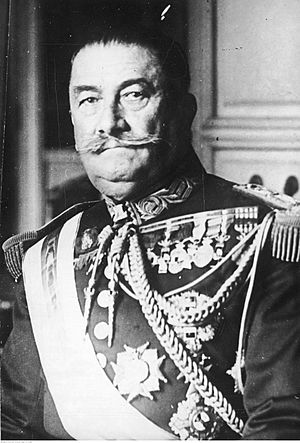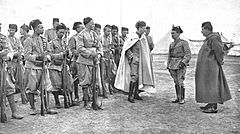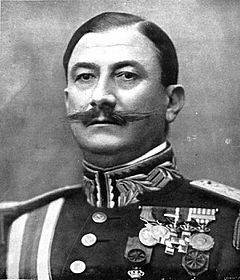Dámaso Berenguer facts for kids
Quick facts for kids
Dámaso Berenguer
1st. Count of Xauen
|
|
|---|---|
 |
|
| Prime Minister of Spain | |
| In office 30 January 1930 – 18 February 1931 |
|
| Monarch | Alfonso XIII |
| Preceded by | Miguel Primo de Rivera |
| Succeeded by | Juan Bautista Aznar-Cabañas |
| Personal details | |
| Born |
Dámaso Berenguer y Fusté
4 August 1873 San Juan de los Remedios, Cuba |
| Died | 19 May 1953 (aged 79) Madrid, Francoist Spain |
| Nationality | Spanish |
Dámaso Berenguer y Fusté (born August 4, 1873 – died May 19, 1953) was an important Spanish general and politician. He was also known as the 1st Count of Xauen. He served as the Prime Minister for about a year. This was during the final part of King Alfonso XIII's time as ruler.
Contents
Who Was Dámaso Berenguer?
Dámaso Berenguer was born in a place called San Juan de los Remedios in Cuba. At that time, Cuba was part of Spain.
Early Military Career
He joined the army in 1889. He served as a soldier in both Cuba and Morocco.
Berenguer took part in the Second Melillan campaign in 1909. He was involved in a battle known as the Barranco del Lobo.
In 1911, he started a special group of soldiers called the Fuerzas Regulares Indígenas. He led them in the Kert campaign. During this campaign, a Riffian leader named Mohamed Ameziane was killed in 1912. This helped end the campaign.
Berenguer was promoted to a high rank, brigadier general, in 1916. Two years later, in 1918, he became a division general.
Becoming a Minister and High Commissioner
In 1918, Dámaso Berenguer became the Minister of War. This meant he was in charge of the army under Prime Minister Manuel García Prieto.
In January 1919, he was given another important job. He became the High Commissioner of Spain in Morocco. This made him the top Spanish official in that region.
He led his troops to take control of a city called Chaouen in 1920. Because of his success and his close relationship with King Alfonso XIII, he was given a special noble title. He became the Count of Xauen.
Challenges in Morocco
The Spanish army faced big problems in Morocco in 1921. There was a major defeat at the Battle of Annual. Many Spanish soldiers were killed after surrendering in Monte Arruit.
An official investigation was started to find out what went wrong. Berenguer, as the High Commissioner, was part of this investigation. He resigned from his role in mid-1922.
Political Changes in Spain
In 1923, there were big changes in Spain's government. A general named Miguel Primo de Rivera took control. He started a new government, and the King appointed him Prime Minister.
Primo de Rivera later stopped the investigation into what happened in Morocco. He also gave Berenguer a pardon.
In 1926, Berenguer became the Chief of Staff for the King's Military House. This was a role often given to trusted generals.
Prime Minister of Spain
In January 1930, Primo de Rivera resigned. King Alfonso XIII then asked Dámaso Berenguer to form a new government. The King wanted to bring Spain back to how it was before 1923.
During his time as Prime Minister, Berenguer made some of the strict rules from Primo de Rivera's time less harsh. Because of this, his government was sometimes called the dictablanda. This means "soft dictatorship," as opposed to the "hard dictatorship" before it.
He faced many challenges. More and more people wanted to end the monarchy. The political parties were not organized after years of strict rule. There were also worker protests and even a military uprising.
Berenguer resigned as Prime Minister in February 1931. He was replaced by Admiral Juan Bautista Aznar-Cabañas. Berenguer then served as Minister of War under Aznar-Cabañas.
Two months later, King Alfonso XIII left Spain, and the Republic was declared. Berenguer faced questions about his actions in Morocco and how he handled a rebellion in 1930. He was cleared in 1935 and then retired from public life.
He passed away in Madrid in 1953.
See also
 In Spanish: Dámaso Berenguer para niños
In Spanish: Dámaso Berenguer para niños
Images for kids
 | Kyle Baker |
 | Joseph Yoakum |
 | Laura Wheeler Waring |
 | Henry Ossawa Tanner |




